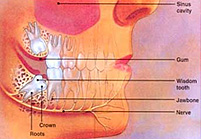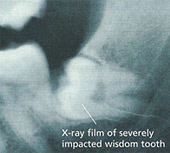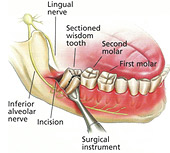Most people have four wisdom teeth, although some people have none at all. Frequently, there is not enough space at the rear of the jaws for wisdom teeth to erupt easily through the gums. If the jaw does not allow enough room for the wisdom tooth to come through, the tooth will become crammed or “impacted”.
Some impacted wisdom teeth remain buried and cause no trouble whatsoever. However, other impacted wisdom teeth may cause severe problems.
If one or more of your wisdom teeth become problematic, your oral and maxillofacial surgeon may recommend that they be removed.
Removal of a wisdom tooth or wisdom teeth is a very common procedure. Removal of troublesome wisdom teeth should usually be performed as soon as possible so as to avoid further problems.
As shown in this illustration, an impacted wisdom tooth may be in contact, or be close to a major nerve. This can sometimes lead to complications during surgical removal of the tooth, as outlined further on.
Some impacted wisdom teeth remain buried and cause no trouble whatsoever. However, other impacted wisdom teeth may cause severe problems.
If one or more of your wisdom teeth become problematic, your oral and maxillofacial surgeon may recommend that they be removed.
Removal of a wisdom tooth or wisdom teeth is a very common procedure. Removal of troublesome wisdom teeth should usually be performed as soon as possible so as to avoid further problems.
As shown in this illustration, an impacted wisdom tooth may be in contact, or be close to a major nerve. This can sometimes lead to complications during surgical removal of the tooth, as outlined further on.


